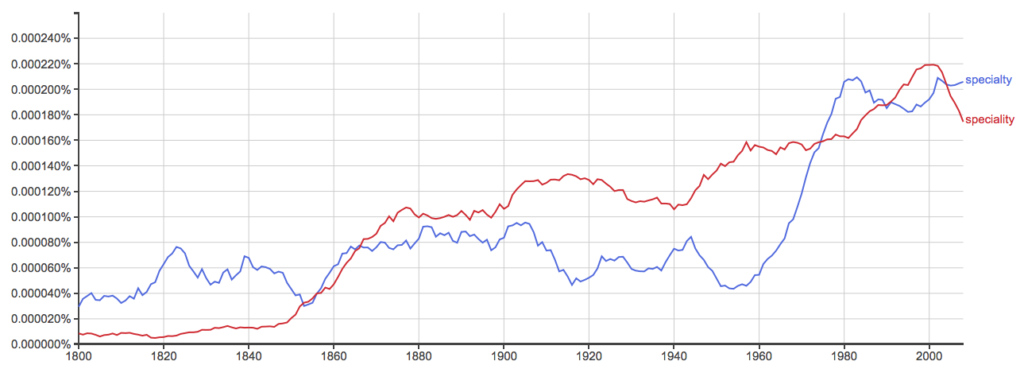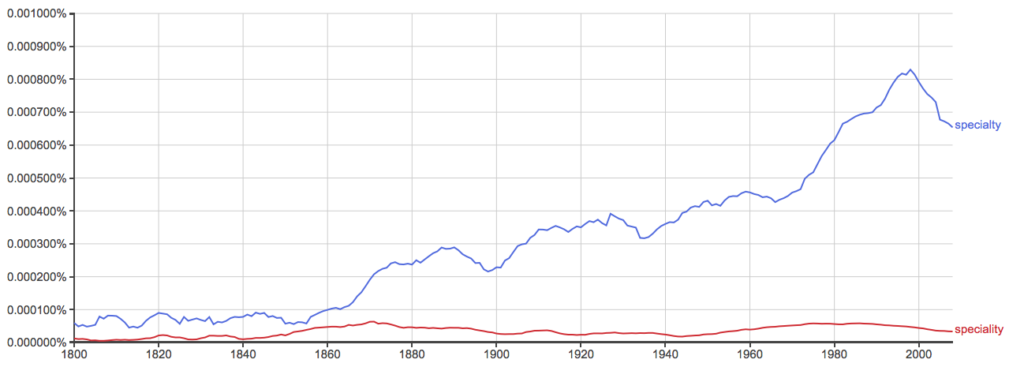There are many differences in spelling between American and British English. Americans, for example, shorten many -our endings to -or. Americans are also more likely to drop -k from the end of words that end in -ck.
Other differences are less systematic. Speciality in British English, for instance, loses a letter to become specialty in American English.
British writers use both spellings of this word, though. Should you use specialty or speciality? Continue reading to find out, while learning more about the history of these words along the way.
What’s the Difference Between Specialty and Speciality?
In this post, I will compare specialty vs. speciality. I will outline when it’s appropriate to use each spelling and show you examples of each in sentence examples for context.
Then, I will share a memory tool that allows you to discern the meanings of these words at a moment’s notice.
When to Use Specialty
 What does specialty mean? Specialty is a noun that means an area of expertise. Scooby-Doo’s specialty is solving mysteries. Garfield’s specialty was eating lasagna. This blog’s specialty is English grammar and usage.
What does specialty mean? Specialty is a noun that means an area of expertise. Scooby-Doo’s specialty is solving mysteries. Garfield’s specialty was eating lasagna. This blog’s specialty is English grammar and usage.
Here are a few more examples,
- When Kevin said he wanted a burger, Jill said “Let’s go to Killer Burger; burgers are their specialty.”
- Alessandra and Mariana went to Voodoo Donut for some specialty donuts at 2:45am.
Specialty can also be used as a modifier to mean meeting particular needs or tastes.
Specialty is related to the noun special, which means unique or noteworthy. It has been in English since the 15th century and can be traced back to Latin through Middle English and early Anglo-French.
When to Use Speciality
What does speciality mean? Speciality is an alternative spelling of the noun specialty. It was common in British English for around 100 years between the mid-19th century and the mid-20th century. It was equivalent in meaning and usage to specialty.
The chart below graphs its usage of speciality vs. specialty.

As you can see, even today, speciality is very close to specialty in British English, though the terms have leapfrogged one another twice since 1970.
In American English, meanwhile, specialty is by far the more popular term,

In addition to being less popular, speciality is not as old as specialty, having first been recorded in English in 1625, compared to specialty’s first use in the 15th century.
Trick to Remember the Difference
These words have identical meanings. The only difference is in their spelling.
- Specialty is by far the more popular choice in American English, so you should use it exclusively with American audiences.
- In British English, the words are roughly interchangeable.
Specialty is common in both language communities, so it is probably the safer default. Note that specialty only has one I, much like America has only one I. This should make it easy to remember to use specialty for American audiences.
Summary
Is it speciality or specialty? Specialty and speciality are alternative spellings of a word that means an area of expertise.
- Specialty is used in both American and British English.
- Speciality is primarily a British spelling.
To be safe, use specialty regardless of your location or region since it appears in both language communities.
Contents
